

YouTube. Mike Caulfield. Picking the right search terms. Max: Lesson Plans – Search Education – Google. Picking the right search terms Beginner Pick the best words to use in academic searching, whether students are beginning with a full question or a topic of just a few words.
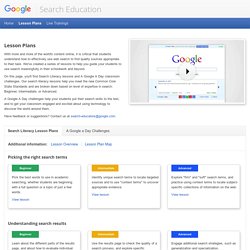
View lesson Advanced Explore "firm" and "soft" search terms, and practice using context terms to locate subject-specific collections of information on the web. Understanding search results Learn about the different parts of the results page, and about how to evaluate individual results based on cues like web addresses and snippets. Engage additional search strategies, such as generalization and specialization.
Narrowing a search to get the best results Apply filtering tools and basic "operators" to narrow search results. Compare results for basic searches with ones that use operators to discover the impact the right operator has at the right time. Searching for evidence for research tasks Evaluating credibility of sources Consider, tone, style, audience, and purpose to determine the credibility of a source. Culture Culture.
Information Wants To Be Free. I’m not sure if I’ve become more cynical or just more observant, but lately I feel like I’ve been seeing things through new eyes.
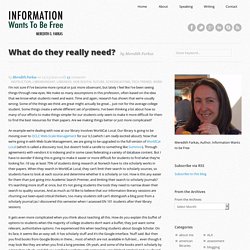
We make so many assumptions in this profession, often based on the idea that we know what students need and want. Time and again, research has shown that we’re usually wrong. Some of the things we think are great might actually be great… just not for the average college student. Some things create a whole different set of problems. I’ve been thinking a lot about how so many of our efforts to make things simpler for our students only seem to make it more difficult for them to find the best resources for their papers. An example we’re dealing with now at our library involves WorldCat Local. It gets even more complicated when you think about teaching all this.
Project Information Literacy’s most recent report indicates that “students think library sources require less evaluation than information posted by anyone on the open-source Web.”
Students' use of web literacy skills and strategies: searching, reading and evaluating Web information. Introduction The Internet is used extensively by children and teenagers, both at home and at school.
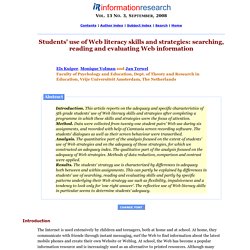
At home, they communicate with friends through instant messaging, surf the Web to find information about the latest mobile phones and create their own Website or Weblog. At school, the Web has become a popular information resource and is increasingly used as an alternative to printed resources. Although many teachers acknowledge the Web's potential as an educational tool as well as the Web's motivating power, they also struggle to find meaningful applications of the Web in their educational practices. The Web is a learning tool that differs from other tools used in education because students acquire a great many Web skills in an out-of-school context and also regard themselves as skilled Web users. In our research we take an interdisciplinary approach in trying to combine the focuses of library/information science and educational researchers. Method Study design Data analysis. Information literacy. The United States National Forum on Information Literacy defines information literacy as " the hyper ability to know when there is a need for information, to be able to identify, locate, evaluate, and effectively use that information for the issue or problem at hand.
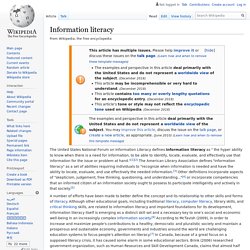
"[1][2] The American Library Association defines "information literacy" as a set of abilities requiring individuals to "recognize when information is needed and have the ability to locate, evaluate, and use effectively the needed information.[3] Other definitions incorporate aspects of "skepticism, judgement, free thinking, questioning, and understanding... A number of efforts have been made to better define the concept and its relationship to other skills and forms of literacy. History of the concept[edit] The phrase information literacy first appeared in print in a 1974 report written on behalf of the National Commission on Libraries and Information Science by Paul G. Obama's proclamation ended with: Background[edit]
Information Literacy 1510776268 regexified. Information Literacy. Copyright This courseware includes resources copyrighted and openly licensed by multiple individuals and organizations.
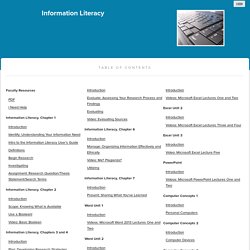
Click the words "Licenses and Attributions" at the bottom of each page for copyright and licensing information specific to the material on that page. If you believe that this courseware violates your copyright, please contact us. Cover Image: "file531283459401. " Authored by: Alviman. Lumen Learning Lumen Learning provides a simple, supported path for faculty members to adopt and teach effectively with open educational resources (OER).